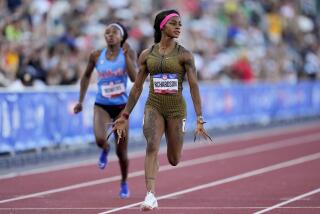It’s Tough to Sugarcoat Edwards’ Positive Test
- Share via
Sprinter Torri Edwards, runner-up in the women’s 100-meter dash at the U.S. Olympic track and field trials, acknowledged Thursday she had run while keeping secret a positive test this season for nikethamide, a potent stimulant banned by anti-doping authorities. But she insisted she is not a cheater.
“I was shocked,” she said. “ ... I had no idea what nikethamide was.”
Edwards said an aide, Christopher Vincent, whom she identified as her physical therapist and chiropractor, purchased glucose tablets “at a local sundry store” while they were in the French Caribbean outpost of Martinique for a meet in April. She said she had a cold and wanted the sugar pills as a pick-me-up. “We’re in a place where they speak French, so he said glucose and this is what they gave him,” she said.
Unknown to them, she said, the brand -- called “Coramine Glucose” -- was laced with nikethamide, a stimulant used in the 1950s to treat sleeping-pill overdoses that itself can be so toxic it is rarely seen anymore in the U.S. Vincent has since been fired, she said.
The developments involving Edwards intensified suspicion about the U.S. track program, already rocked this year by the BALCO doping scandal, and muddied the status of the U.S. team bound for Athens.
“That’s what I was worried about. I didn’t want to be grouped with that,” meaning the BALCO scandal, Edwards said in an interview Thursday. “I feel horrible I’m adding to it. I’ve always promoted a clean sport. I’ve never taken any performance-enhancing drugs. I’ve never needed to. I’m definitely going to fight it all the way.”
The U.S. Anti-Doping Agency has charged six other U.S. track athletes with doping, including Tim Montgomery, the world-record holder in the 100-meter dash, and middle-distance standout Regina Jacobs.
Montgomery failed to qualify for the Olympics, finishing seventh in the 100 on Sunday at the trials. Jacobs, who allegedly tested positive last summer for THG, the designer steroid at the center of the BALCO scandal, announced Thursday she was retiring from track and field.
Another of the six, Calvin Harrison, who faces a two-year ban after testing positive last summer for the stimulant modafinil, finished fifth Thursday night in the 400-meter final and failed to make the Olympic team.
Marion Jones remains a focus of USADA’s inquiry, though she has not been charged and has repeatedly denied using performance-enhancing substances. She won the long jump Thursday to earn a berth on the team.
An arbitration hearing in Edwards’ case is set for Monday. The makeup of the U.S. team can’t be assured until after her hearing and others wrap up -- which could take weeks.
Edwards was due to receive the gold medal in the 100 and silver in the 200 from last August’s world championships in Paris. U.S. sprinter Kelli White, fastest on the track in both events, was disqualified after admitting this year to doping.
Edwards said she had learned on the same day in May that she had been elevated to world champion in the 100 and that she had tested positive.
“It’s been so hard, and I actually feel better now that it’s out,” said Edwards, 27, formerly of USC. “I’ve been dealing with this for over two months now. I wanted to be sure that people close to me were prepared, my family and my friends.”
Steven Ungerleider, an Oregon-based anti-doping researcher and author, said, “I’m once again deeply saddened that we have gifted athletes, talented athletes, who are making it through the trials process and making the team, only to end up with a problem.”
Olympic anti-doping rules state that an athlete is responsible for whatever is in his or her body, no matter how it got there.
A first offense for certain stimulants and steroids means a two-year ban from competition. The suspension can be reduced to a public warning if an athlete can prove a substance was used inadvertently.
Edwards is one of four members of the Southern California-based HSI track club to test positive for stimulants in recent years. The others are:
* Mickey Grimes, stripped of the gold medal in the 100 at last summer’s Pan American Games after testing positive for ephedrine. He was eliminated in the trials’ semifinals.
* Inger Miller, the 1999 world champion in the 200 and 1996 Olympic gold medalist in the 400 relay. She tested positive for caffeine during the 1999 world indoor championships and was stripped of the bronze medal she’d won in the 60-meter dash. She did not qualify for the finals Saturday in the 100 at the trials.
* Ato Boldon, the Olympic silver medalist at the 2000 Sydney Games in the 100, tested positive for ephedrine at the Mt. San Antonio College Relays in April 2001.
Agent Emanuel Hudson, who heads HSI along with coach John Smith, said any suggestion of impropriety at his camp is misplaced. Referring to Miller’s case, he said, “We got anybody in this country at Starbucks? They’re all dirty too?”
Another HSI athlete, Larry Wade, the 2003 Pan Am Games gold medalist in the 110-meter hurdles, is under investigation on suspicion of steroid use, two sources said. Hudson said, “Larry Wade doesn’t have any problem, nor does he have any steroid problem.”
Edwards said she intended to compete at the trials in the 200. The preliminary rounds go off today, the finals Sunday.
Abrahamson reported from Los Angeles, Elliott from Sacramento.
More to Read
Go beyond the scoreboard
Get the latest on L.A.'s teams in the daily Sports Report newsletter.
You may occasionally receive promotional content from the Los Angeles Times.







